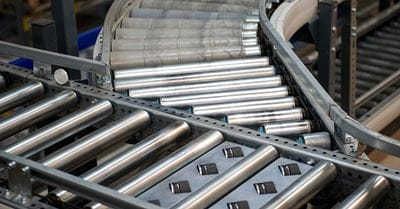Sortation Systems | Stockton

Raymond West supplies a full range of conveyor and automation products, including all types of sortation solutions.
To speak with a Raymond automation expert, phone us at (800) 675-2500.
Are you considering a sortation system for your local warehouse, distribution center or production facility? The most common kinds of sortation systems vary widely in capability and cost. In this article we provide a high level overview of the benefits and shortcomings of the three most prominent kinds of sortation systems.
Cross-Belt Sorter & Tilt Tray Sorter
Cross-belt and tilt-tray sortation systems deliver similar functionality and are oftentimes associated when talking about sortation automation. However, they are very different mechanisms.
Tilt-tray sorters are a series of trays attached to carts that are transported on a continuous-loop conveyor. Items are added to the trays at one or more induction stations on the loop via manual or automatic procedures. When a product reaches its sorting location, the tray that is transferring it tilts and transfers the product onto a chute.
Cross-belt sorters are motorized belt conveyors mounted to carts running on a continuous conveyor loop. Similar to tilt-trays, cross-belt sorters move materials onto a chute when they reach the appropriate sorting location.
Advantages: Tilt-tray and Cross-belt sorters provide the best sorting rate and can manage a wide array of product types when compared to other sortation solutions. They are a great alternative for operations that manage a variety of SKUs. These kinds of systems are likewise fairly quiet and enable a more comfortable workplace for warehouse personnel.
Disadvantages: The speed, capacity and versatility or these sorters come at a price-- they are among the most costly sortation solutions offered.
Shoe Sorter
Sliding shoe sorters utilize a "shoe" system attached to the conveyor surface that moves and diverts materials onto a secondary, after-sort conveyor. Shoe sorter solutions receive goods from a unified stream of items that may be a consolidated feed from numerous upstream areas of a facility. These kinds of sortation systems are widely utilized in shipping applications.
Advantages: Sliding shoe sorter equipment setups enable a relatively high peak rate, sometimes several hundred items per minute, depending upon the product size and weight. Additionally, a vast array of products can be handled due to the simplicity and versatility of a positive divert system.
Disadvantages: Shoe sorters are more expensive than other options like pop-up wheel sorters. Also, divert centers are not readily movable, making the system challenging and costly to rearrange. These systems often generate more noise than tray or belt systems and are therefore not as worker compatible as other kinds of sorters.
Pop-up Wheel Sorter
Pop-up wheel sorters are an attractive alternative because they are fairly affordable and easy to implement. Wheels or rollers are incorporated into a belt conveyor. When an item must be diverted, the wheels pop up to divert items at an angle to an alternate, downstream conveyor.
Advantages: Pop-up wheel sorters are adaptive, so components can be rapidly added or eliminated when the line needs modification. These systems can also be substantially less expensive than other sorter choices.
Disadvantages: These kinds of sorters offer significantly less speed and capability than shoe, cross-belt or tilt-tray options. They will certainly increase efficiency, but might not multiply total output like other alternatives. Due to the fact that pop-up systems don't offer a positive divert, the types of products they can process are reduced.
Automated Sortation Systems Near Me
If you'd like more information on sortation alternatives, call an automation professional at Raymond West today!
Raymond West's Stockton facility serves much of the northern Central Valley, including Stockton, Lathrop, Lodi, Tracy, Modesto, and Merced.
Raymond West | Stockton Material Handling Equipment Supplier
19107 Christopher Way
Lathrop, CA 95330
(800) 675-2500

